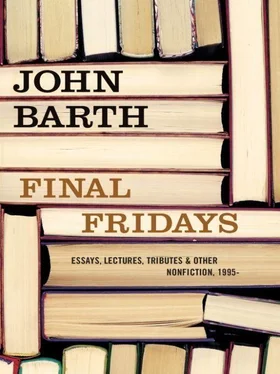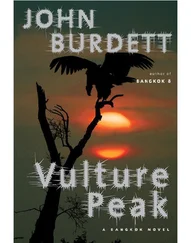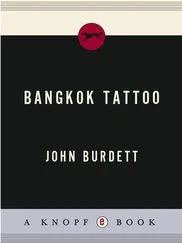MOST OF THE pieces here collected have been published separately, in slightly different form. The author gratefully acknowledges the following sources: The New York Times Magazine for “Keats’s Fears, Etc.”; The Wilson Quarterly for “The State of the Art”; Dalkey Archive Press for the forewords to LETTERS and Sabbatical ; Anchor Books for “‘In the Beginning’”; U. Michigan Press for “Further Questions?”; Story Press for “Incremental Perturbation”; Context for “‘The Parallels!’”; U. Mississippi Press for “My Faulkner”; U. de León for “¿Cien Años de Qué?”; Journal of Experimental Fiction for “The End of the Word as We’ve Known It?”; Hartford Courant for “The Place of ‘Place’ in Fiction”; Albuquerque Tribune for “Liberal Education: The Tragic View”; Einaudi for “The Relevance of Irrelevance: Writing American”; Poets & Writers Magazine for “‘All Trees Are Oak Trees. .: Introductions to Literature’”; Writers Digest Press for “The Inkstained Thumb”; Tin City for “Future Imperfect”; Sarabande Books for “I.”; The Believer for “‘In the Beginning, Once Upon a Time, It Was a Dark and Stormy Night’”; Signet Classics (Penguin Group USA) for “The Morning After”; The Atlantic for “Do I Repeat Myself?”; Granta for “The End?”; Random House for “Introduction to Not-Knowing ”; New York Times Book Review for “The Passion Artist”; U. Delaware Press for “The Accidental Mentor”; Review of Contemporary Fiction for “‘As Sinuous and Tough as Ivy’”; American Scholar for “The Judge’s Jokes.”
FOREWORD: To the Hyphen, and Beyond
IN 1984, HAVING reached age four-and-fifty and published eight volumes of fiction, I assembled a collection of essays, lectures, and other nonfiction pieces under the title The Friday Book . 1It was so called, its preface explained, because 1) at that time and for years thereafter, my wife and I, teachers both, routinely met our classes from Mondays through Thursdays and then shifted from Baltimore across Chesapeake Bay for long weekends and summer vacations at our Eastern Shore retreat near the old colonial customs port of Chestertown, Maryland; and 2) being prevailingly a novelist by temperament, with the habit of scratching away at some extended prose fiction on those weekday mornings before my afternoon sessions with undergraduate and graduate-student apprentices in the Johns Hopkins Writing Seminars, I found it a refreshing change of pace as well as a logistical convenience not to haul the accumulating notes, drafts, and research materials for whatever novel was in the works back and forth across the Bay, and instead to dedicate those Friday work-mornings to the muse of nonfiction. The practice soon became so established that I found myself inclined to it more often than not on school-vacation Fridays as well, when Logistical Convenience was no longer a factor. A sort of Shabbat -respite, it was, from the invention of characters, scenes, and plot-developments for novels, novellas, and short stories: one that, however — unlike the Jewish or Christian Sabbaths — could readily be shifted to a different day if the demands of some fiction-in-progress (or travel commitment, or whatever) took precedence. Contrariwise, I might declare some Tuesday or Saturday to be a “Friday” if some lecture- or essay-draft needed extra attention as its deadline approached.
Thus The Friday Book .
Three novels and 520 Fridays later, I had accumulated a second volumesworth of such pieces: Further Fridays: Essays, Lectures, and Other Nonfiction, 1984–1994 . 2By then five-and- sixty , I retired from 40-plus labor-intensive but enormously rewarding years of teaching, as did my wife from her less lengthy but even more intensive pedagogical career. We continued, however — and, as of this writing, continue to continue — our weekday work-morning routines: me seeing what my primary and secondary muses will come up with next, she serving as my indispensable Primary Editor, General Manager of our household, and what in French resort hotels is called Le Planning : the arranger and scheduler-in-chief of our appointments and errands, chores and pleasures.
Et voilà: After not another ten this time, but some fifteen yearsworth of further Fridays since Further Fridays , having delivered myself of six more volumes of fiction, I find as I approach age 80 that I’ve accumulated enough nonfiction-pieces for yet a third collection: not 1995–2005 , in tidy sequence with its predecessors, but 1995– .
AND I PAUSE at that hyphen, which gives one pause, like those cemetery headstones bearing a deceased spouse’s birth- and death-dates and the bereft survivor’s birthdate followed by hyphen and blank marble awaiting gravure. (Remember the awkward situation of some such pre-planners at the turn of the millennium, who had engraved their headstones 1910–19__ , say, and finding themselves still breathing air and taking nourishment in c.e. 2000, were obliged to have their grave-markers replaced or re-engraved? Given the ever-increasing longevity of dwellers in our planet’s better-off precincts, best to end with the hyphen, even in a new century.) Just as my waiting grave’s marker, if there were one, would read 1930– , I’m dating these Friday-pieces 1995– ; and I call their assemblage Final Fridays on the same actuarial grounds that lead me to regard my eighties as my Final Decade.
“You should live so long!” some friend or family member might well tease. Given my thus-far-uncommonly-good health, and barring accident or general catastrophe, I just might, guys 3—and even longer, though I’ve no desire to unless this book’s dedicatee is with me and we’re still enjoying life more than not. A fair-fortuned life it’s been: If we know some more-blessed ones, we know ever so many less. Among its blessings, in my case, has been the pleasure of imagining, languaging, and publishing all those stories and essays — the latter mainly, though by no means exclusively, on the reading and writing of fiction. The ones in The Friday Book and Further Fridays were ordered chronologically by date of first publication; in the present volume they’re ordered likewise, but within two groups: pieces about “Reading, Writing, and the State of the Art,” and then “Tributes and Memoria” to sundry literary comrades, colleagues, and other navigation stars.
I CONCLUDE THIS Foreword on the final Friday of the fifth month of the ninth year (or tenth, depending on one’s counting-system) of the 21st century of the Common Era, having published yet another story-book 4and preparing to review and revise these accumulated nonfiction pieces over the next many “Fridays”—some of them Mondays, Tuesdays, Wednesdays, Thursdays, perhaps even the odd Saturday or Sunday — while awaiting re-inspiration 5by my Muse-in-Chief. I do not know now in what year these Final Fridays will appear in print (“The world should last so long!” I hear again that Yiddish-inflected Voice Off, probably the Muse’s, simultaneously hoping, half-doubting, teasing, and counter- verhexing ). Nor do I promise that there’ll be no further Friday-pieces thereafter from this pen: At my age and stage, one presumes neither way. But in the not-unimaginable event that the world, my muse, and I all manage to persist, I intend to leave open in this collection’s subtitle that space beyond the hyphen.
Читать дальше












